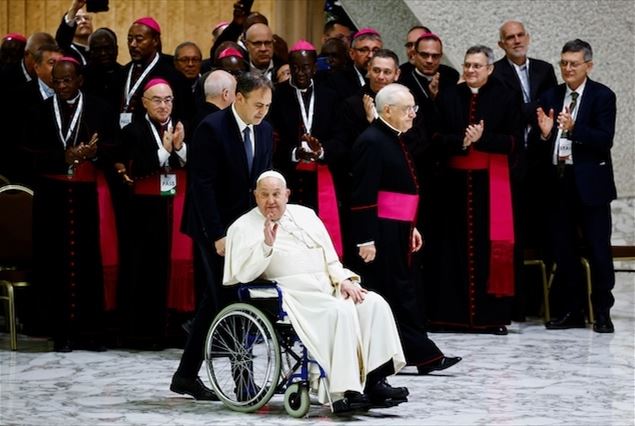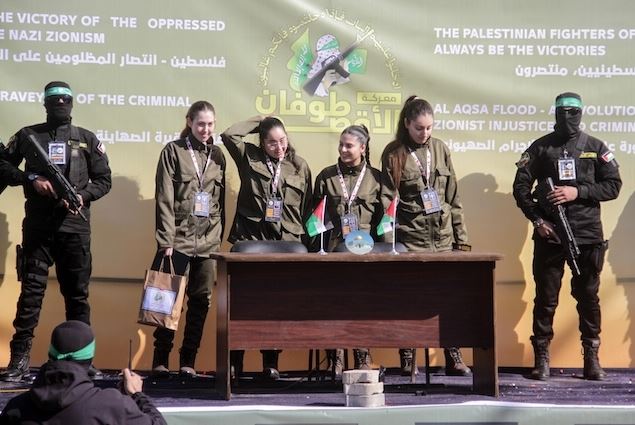
«In my hands I have a nine-page speech», Pope Francis said off the cuff to the participants in the Jubilee of Communication, «At this hour, with my stomach starting to move, reading nine pages would be torture. I will give this to the Prefect. Let him communicate it to you. I just wanted to say a word about communication. Communicating is stepping outside of yourself a little to give something of mine to the other. And communication is not only the exit, but also the meeting with the other. Knowing how to communicate is great wisdomgreat wisdom! I am happy with this Jubilee of communicators. Your work is work that builds: it builds society, it builds the Church, it makes everyone move forward, as long as it is true. “Father, I always say the truth…” – “But are you true? Not only the things you say, but you, in your interior, in your life, are you true?”. It’s such a great test. Communicating what God does with the Son, and God’s communication with the Son and the Holy Spirit. Communicate something divine. Thank you for what you do, thank you very much! I’m happy. And now I would like to greet you, and first of all give the blessing.
We publish the speech delivered in its entirety below
Dear sisters and brothers, good morning! I thank all of you for coming in so many and from many different countries, from far and near. It’s really nice to see you all here. I thank the guests who spoke before me – Maria Ressa, Colum McCann and Mario Calabresi – and I thank maestro Uto Ughi for the gift of music, which is a way of communication and hope. This meeting of ours is the first major event of the Holy Year dedicated to a “vital world”, the world of communication. The Jubilee is celebrated in a difficult moment in the history of humanity, with the world still wounded by wars and violence, by the shedding of so much innocent blood. Because of this First of all, I want to say thank you to all the communications workers who put their lives at risk to seek the truth and tell the horrors of war. I would like to remember in prayer all those who have sacrificed their lives in this last year, one of the deadliest for journalists (1).
We pray silently for your colleagues who signed their service with their own blood. I also want to remember with you all those who are imprisoned simply for having been faithful to the profession of journalist, photographer, video operator, for having wanted to go and see with their own eyes and for having tried to tell what they saw. There are many! (2)
But in this Holy Year, in this jubilee of the world of communication, I ask those who have the power to do so that all unjustly imprisoned journalists be freed. May a “door” be opened for them too through which they can return to freedom, because the freedom of journalists increases the freedom of all of us. Their freedom is freedom for each of us. I ask – as I have done several times and as my predecessors did before me – that freedom of the press and expression of thought be defended and safeguarded together with the fundamental right to be informed. Free, responsible and correct information is a heritage of knowledge, experience and virtue that must be preserved and promoted. Without this, we risk no longer distinguishing truth from lies; without this, we expose ourselves to growing prejudices and polarizations that destroy the bonds of civil coexistence and prevent us from rebuilding fraternity.
Being a journalist is more than a profession. It is a vocation and a mission. You communicators have a fundamental role for society today, in telling the facts and in the way you tell them. We know it: language, attitude, tones can be decisive and make the difference between a communication that rekindles hope, creates bridges, opens doors, and a communication that instead increases divisions, polarizations, simplifications of reality . Yours is a peculiar responsibility. Yours is a precious task. Your working tools are words and images. But before them study and reflection, the ability to see and listen; to take the side of those who are marginalized, of those who are neither seen nor heard and also to revive – in the hearts of those who read you, listen to you, watch you – the sense of good and evil and a nostalgia for the good that you tell and that, by telling, you bear witness to.
I would like, in this special meeting, to deepen the dialogue with you. And I am grateful to be able to do so starting from the thoughts and questions that two of your colleagues shared just now. Maria, you spoke about the importance of courage to initiate the change that history asks of us, the change necessary to overcome lies and hatred. It’s true, it takes courage to initiate changes. The word courage comes from the Latin cor, cor habeo, which means “to have heart”. It is about that inner drive, that strength that comes from the heart that enables us to face difficulties and challenges without being overwhelmed by fear.
With the word courage we can summarize all the reflections of the World Communications Days of recent years, up to the Message bearing yesterday’s date: listen with the heart, speak with the heart, guard the wisdom of the heart, share the hope of the heart . In recent years it has therefore been my heart that has dictated to me the guideline for our reflection on communication. For this reason, I would like to add to my appeal for the liberation of journalists another “appeal” that concerns us all: that for the “liberation” of the inner strength of the heart. Of every heart! Taking up the appeal is up to none other than us. Freedom is the courage to choose. Let us take the opportunity of the Jubilee to renew, to rediscover this courage. The courage to free the heart from what corrupts it. Let’s put respect for the highest and noblest part of our humanity back at the center of the heart, let’s avoid filling it with what rots and causes it to rot.
The choices of each of us count, for example, in expelling that “brain rot” caused by the addiction to continuous scrolling on social media, defined by the Oxford Dictionary as word of the year. Where can we find the cure for this disease if not by working, all together, on training, especially for young people? We need media literacy, to educate ourselves and educate ourselves in critical thinking, in the patience of discernment necessary for knowledge; and to promote personal growth and the active participation of everyone in the future of their communities. We need courageous entrepreneurs, courageous computer engineers, so that the beauty of communication is not corrupted. Great changes cannot be the result of a multitude of sleeping minds, but rather begin from the communion of enlightened hearts. A heart like this was that of San Paolo. The Church celebrates his conversion today. The change that occurred in this man was so decisive that it marked not only his personal history but that of the entire Church. And Paul’s metamorphosis was caused by his face-to-face encounter with the risen and living Jesus. The strength to set out on a path of transformative change is always generated by direct communication between people. Think about how much power for change is potentially hidden in your work every time you bring together realities that – through ignorance or prejudice – are in conflict!
The conversion, in Paul, derived from the light that enveloped him and the explanation that Ananias then gave him in Damascus. Your work too can and must provide this service: finding the right words for those rays of light that manage to hit the heart and make us see things differently. And here I would like to connect to the theme of the transformative power of narration, telling and listening to stories, which Colum highlighted. Let’s go back for a moment to Paul’s conversion. The event is narrated in the Acts of the Apostles three times (9.1-19; 22.1-21; 26.2-23), but the core always remains Saul’s personal encounter with Christ; the way of telling changes, but the founding and transformative experience remains unchanged. Telling a story corresponds to the invitation to have an experience. When the first disciples approached Jesus asking him “Master, where are you staying?” (Jn 1:38), He did not respond by giving them his home address, but said: “Come and see” (v. 39). Stories reveal our being part of a living fabric; the interweaving of threads with which we are connected to each other. (3)
Not all stories are good and yet these too must be told. Evil must be seen to be redeemed; but it must be told well so as not to fray the fragile threads of coexistence. In this Jubilee I therefore make another appeal to you gathered here and to communicators around the world: also tell stories of hopestories that nourish life. Your storytelling is also hope telling. When you talk about evil, you leave room for the possibility of mending what is torn, for the dynamism of good that can mend what is broken. Sow questions. Talking about hope means seeing the crumbs of good hidden even when everything seems lost, it means allowing us to hope even against all hope. (4) It means noticing the sprouts that appear when the earth is still covered in ashes. Talking about hope means having a gaze that transforms things, makes them become what they could, what they should be. It means making things move towards their destiny. This is the power of stories. And this is what I encourage you to do: talk about hope, share it. This is – as Saint Paul would say – your “good fight”. Thank you, dear friends! I heartily bless all of you and your work. And please don’t forget to pray for me. _________________________________________________
(1) According to the annual report of the International Federation of Journalists there are more than 120.
(2) According to Reporters Without Borders there are more than 500. In a press release published at the end of 2024, RSF underlines that “incarceration remains one of the preferred means of those who undermine press freedom”.
(3) Cf. «So that you can tell and remember» (Ex 10,2). Life becomes history, Message for the 54th World Communications Day, 2020.
(4) Cf. Share with meekness the hope that is in your hearts. Message for the 59th World Communications Day, 2025.







